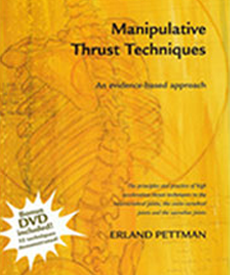Erl Pettman qualified as a Physical Therapist in Nottingham, England in 1972. He emigrated to Canada in 1974 where he began his first structured education in Orthopaedic Manual Therapy (OMT). His desire to teach OMT would be realised in Calgary, Alberta where he taught a Level I (Introduction to OMT) in 1977. He has continued to teach nationally and internationally to this day.
Throughout this time he was an avid student himself citing his professional influences from a very diverse field including James Cyriax, Alan Stoddard, Fred Mitchell Jr, Greg Grieves, Geof Maitland, Robin McKenzie, Stan Paris, Freddie Kaltenborn, Olaf Evjenth, Wendy Aspinal, Bob Elvey, Dave Butler and Nick Bogduk. Erl satirically muses that such a list, in itself, means you must be getting old. However, he attributes his own personal development in OMT to the three men who selflessly established the Canadian
Orthopaedic Division of the Canadian Physiotherapy Association. They were David Lamb, Cliff Fowler and John Oldham.
Erl went on to produce Canada’s first eclectic OMT course in 1979, The Upper Quadrant Course, where he linked postural and spinal dysfunction to upper limb dysfunctions. A year later he introduced ‘The Lower Quadrant Course’ with a similar emphasis. These two courses would become the precursors to the Level III Upper and Lower Quadrant Courses taught today by both the Canadian Orthopaedic Division and the North American Institute of Orthopaedic Manual Therapy (NAIOMT).
Utilising the Quadrant’ concept as its theme Erl constructed and organised Western Canada’s first long-term OMT course, with clinically supervised practice, in 1981. Interestingly, he designed the course to be taught by a young physical therapist that Erl thought was a definite rising star. Her name was Diane Lee.
Increasing interest in the ‘Canadian System’ of OMT from American PT’s saw Erl, Dave and Cliff teaching increasing numbers of courses for US Orthopaedic Manual Therapists. They were soon joined by Jim Meadows and later by Ann Porter-Hoke. Erl would ultimately convince this motley crew of British immigrants to found the North American Institute of Orthopaedic Manual Therapy (NAIOMT). Eventually incorporated as an American OMT teaching institute in 1994 it continues as a leading light in US post-professional education, one of the few that can bestow its graduates a Fellowship in the American Academy of Orthopedic Manual Therapy (AAOMT).
Erl has continued his promotion of the pursuit of excellence in OMT as an adjunct professor of the Doctor of Science in Physical Therapy (DScPT) program at Andrews University, Michigan.
In 2020, facing all the challenges of the COVID pandemic, Erl founded his new educational institute ASPIRE.
